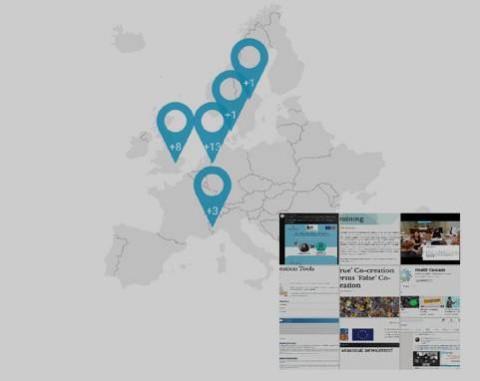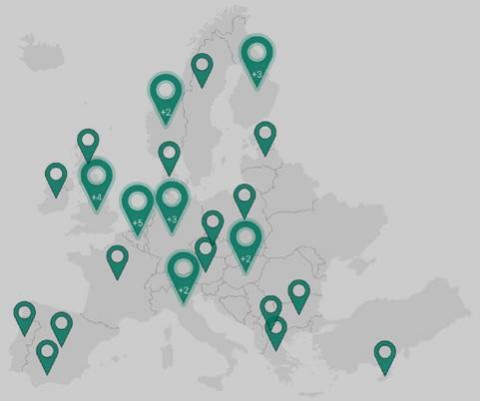Special Issue: Open Science in its many forms - Empowering co-creation through Open Science: Insights from Health CASCADE
Newsletter
This piece gives an account of my engagements within the salient realm of Open Science (OS) - a movement championing openness, transparency, and collaboration in research. Drawing from my journey as a Marie Skłodowska-Curie PhD Fellow, it explores how OS principles have shaped my teaching and research practices, from presenting at respected institutions across Europe to co-developing wide-scale policy précis aimed at European member states.
Bionote
Katrina Messiha is a Marie Skłodowska-Curie PhD Fellow in the European Commission project, Health CASCADE. Her doctoral research is focused on establishing conceptual and methodological principles for co-creation approaches in public health research. As this field continues to evolve, Katrina aims to develop core theory-based principles that can address health inequalities and complex, ‘wicked’ public health challenges through interdisciplinary research and policy development. Katrina has recently served as a visiting academic and policy researcher at EuroHealthNet as well as a visiting researcher at the University of Cambridge.
Open Science (OS) advocates for the early sharing of scientific knowledge throughout the discovery process, rooted in principles of openness, transparency, rigor, reproducibility, and knowledge accumulation (Friesike et al., 2015). This transformative movement is gaining noticeable traction worldwide, particularly in Europe, where the urgency for open data practices has become increasingly apparent (Vicente-Saez and Martinez- Fuentes, 2018). International funders, including the European Union, are now prioritizing data accessibility (Stieglitz et al., 2020). Yet, despite calls for collaboration among the Quadruple Helix actors - government, academia, industry, and civil society - scientific knowledge creation frequently remains confined to closed silos (Mačiulienė, 2022). This prompts critical questions about how we might better integrate OS principles into our academic and professional practices.
As a Marie Skłodowska-Curie PhD Fellow, I have focused my research and teaching on the practical application and embodiment of OS principles (Figure 1). In my lectures on Program and Policy Implementation in Public Health at Amsterdam University College (AUC) and while guiding students at VU University Medical Center (VUmc) in Research Proposal Writing and Research Methods, I emphasize knowledge dissemination and collaborative learning to nurture future scholars. My scientific presentations at the University of Cambridge, where I focused on the Complexities of Multidisciplinary Work and Discourse Analysis in Co-creation, illustrate the practical applications of OS. Furthermore, discussions on my PhD topic, Theory-based Principles for Co-creation in Public Health at Amsterdam UMC and Amsterdam Public Health Institute, highlighted the importance of sharing research findings to enhance the quality and impact of scientific inquiry. I have also delivered seminars at Birkbeck, University of London on my PhD topic and lectured at the University of East London on Co-production and Research Communities, reinforcing my dedication to OS across diverse academic contexts.

In addition to presenting at international conferences such as the 6th International Conference on Practice Research in Social Work at Aalborg University, I have engaged in academic initiatives such as the International Society of Behavioral Nutrition and Physical Activity (ISBNPA) Inclusivity and Diversity working group. These experiences have fostered rich exchanges of ideas among scholars and contributed to vital discussions on public health and co-creation. Another role in co-organizing the 'Participatory Research & Co-Creation' special interest group at the Amsterdam Public Health Institute further exemplifies my commitment to OS. This initiative hosts quarterly meetings that provide an open platform for discussing co-creation, enabling researchers to share ongoing work, seek constructive feedback, and collaborate across disciplines. This interest group embodies the principles of inclusivity and accessibility, creating a supportive environment for both early-career and seasoned researchers to enrich the evolving knowledge base on participatory research and co-creation.
A substantial achievement in my academic career has been the co-development of the policy précis, “Promoting Health Equity through Social Participation and Citizen Engagement” at EuroHealthNet, a not-for- profit partnership focused on public health and reducing inequalities (Figure 2). This policy précis addresses the critical issue of limited and unequal citizen engagement in health policymaking, which often neglects historically excluded population groups and results in policies that fail to reflect public needs. By underlining the salience of inclusive social participation, the précis highlights how such engagement can reduce health inequalities and foster trust within communities. It advocates for policymakers to implement structured engagement mechanisms, such as citizen panels, to ensure that diverse perspectives effectively inform health policies.

I have also engaged with key global health organizations, including the World Health Organization HQ in Geneva, Médecins Sans Frontières, and the Geneva Health Forum, to present my PhD findings and facilitate knowledge exchange. These in-person discussions not only disseminated my research but also embodied the principles of OS by fostering collaboration and dialogue among various relevant stakeholders in the field of public health co-creation.
Beyond formal engagements, I find joy in writing blogs that address my PhD topic, such as “True’ Co-creation Versus ‘False’ Co-creation” for Health CASCADE and “Critical Realist Insights: Navigating Interpretation and Experience of Co-development Work” for the ComPHAD Project at the University of Cambridge, all with the intent of making my work accessible to a broader audience. I actively upload my research to OS platforms like Zenodo and publish in reputable journals that offer open access. Furthermore, I leverage social media, particularly LinkedIn, to advocate for best practices in co-creation and share my insights. I have also developed resources on our project website to facilitate reflection and engagement with co-creation, specifically related to Thinking for Co-creation. I will endeavor to continue embracing OS since OS empowers us to illuminate the unknown and transform ideas into impactful realities.
Katrina Messiha
Marie Skłodowska-Curie PhD Fellow, Amsterdam UMC
k.m.messiha@amsterdamumc.nl
References
Mačiulienė, M. (2022). Open science and innovation: A path towards a quadruple helix model. Journal of Innovation and Knowledge, 7(3), 188-194.
Friesike, S., Widenmayer, B., Gassmann, O., & Schildhauer, T. (2015). Opening science: towards an agenda of open science in academia and industry. Journal of Technology Transfer, 40(4), 581-601.
Stieglitz, S., Lattemann, C., Brockmann, T., & Hoang, H. (2020). Open innovation in science: Opportunities and challenges. Technology Innovation Management Review, 10(11), 10-18.
Vicente-Saez, R., & Martinez-Fuentes, C. (2018). Open science now: A systematic literature review for an integrated definition. Journal of Business Research, 88, 428-436.